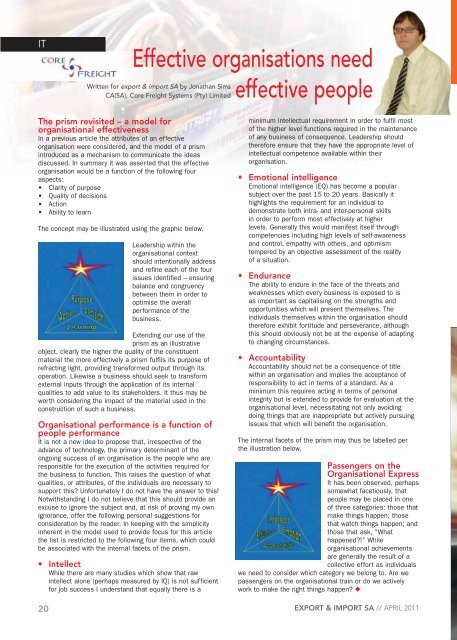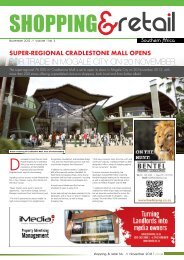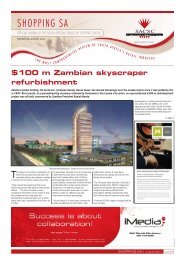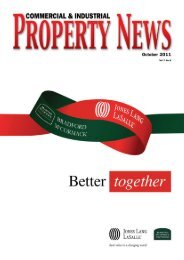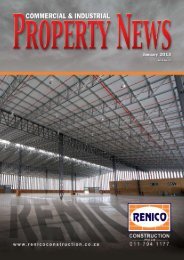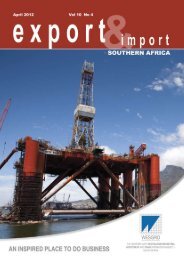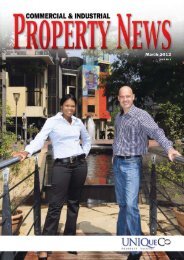April 2011 - Malnor
April 2011 - Malnor
April 2011 - Malnor
Create successful ePaper yourself
Turn your PDF publications into a flip-book with our unique Google optimized e-Paper software.
IT<br />
20<br />
Effective organisations need<br />
effective people<br />
Written for export & import SA by Jonathan Sims<br />
CA(SA), Core Freight Systems (Pty) Limited<br />
The prism revisited – a model for<br />
organisational effectiveness<br />
In a previous article the attributes of an effective<br />
organisation were considered, and the model of a prism<br />
introduced as a mechanism to communicate the ideas<br />
discussed. In summary it was asserted that the effective<br />
organisation would be a function of the following four<br />
aspects:<br />
� Clarity of purpose<br />
� Quality of decisions<br />
� Action<br />
� Ability to learn<br />
The concept may be illustrated using the graphic below.<br />
Leadership within the<br />
organisational context<br />
should intentionally address<br />
and refine each of the four<br />
issues identified – ensuring<br />
balance and congruency<br />
between them in order to<br />
optimise the overall<br />
performance of the<br />
business.<br />
Extending our use of the<br />
prism as an illustrative<br />
object, clearly the higher the quality of the constituent<br />
material the more effectively a prism fulfils its purpose of<br />
refracting light, providing transformed output through its<br />
operation. Likewise a business should seek to transform<br />
external inputs through the application of its internal<br />
qualities to add value to its stakeholders. It thus may be<br />
worth considering the impact of the material used in the<br />
construction of such a business.<br />
Organisational performance is a function of<br />
people performance<br />
It is not a new idea to propose that, irrespective of the<br />
advance of technology, the primary determinant of the<br />
ongoing success of an organisation is the people who are<br />
responsible for the execution of the activities required for<br />
the business to function. This raises the question of what<br />
qualities, or attributes, of the individuals are necessary to<br />
support this? Unfortunately I do not have the answer to this!<br />
Notwithstanding I do not believe that this should provide an<br />
excuse to ignore the subject and, at risk of proving my own<br />
ignorance, offer the following personal suggestions for<br />
consideration by the reader. In keeping with the simplicity<br />
inherent in the model used to provide focus for this article<br />
the list is restricted to the following four items, which could<br />
be associated with the internal facets of the prism.<br />
�� Intellect<br />
While there are many studies which show that raw<br />
intellect alone (perhaps measured by IQ) is not sufficient<br />
for job success I understand that equally there is a<br />
minimum intellectual requirement in order to fulfil most<br />
of the higher level functions required in the maintenance<br />
of any business of consequence. Leadership should<br />
therefore ensure that they have the appropriate level of<br />
intellectual competence available within their<br />
organisation.<br />
�� Emotional intelligence<br />
Emotional intelligence (EQ) has become a popular<br />
subject over the past 15 to 20 years. Basically it<br />
highlights the requirement for an individual to<br />
demonstrate both intra- and inter-personal skills<br />
in order to perform most effectively at higher<br />
levels. Generally this would manifest itself through<br />
competencies including high levels of self-awareness<br />
and control, empathy with others, and optimism<br />
tempered by an objective assessment of the reality<br />
of a situation.<br />
�� Endurance<br />
The ability to endure in the face of the threats and<br />
weaknesses which every business is exposed to is<br />
as important as capitalising on the strengths and<br />
opportunities which will present themselves. The<br />
individuals themselves within the organisation should<br />
therefore exhibit fortitude and perseverance, although<br />
this should obviously not be at the expense of adapting<br />
to changing circumstances.<br />
�� Accountability<br />
Accountability should not be a consequence of title<br />
within an organisation and implies the acceptance of<br />
responsibility to act in terms of a standard. As a<br />
minimum this requires acting in terms of personal<br />
integrity but is extended to provide for evaluation at the<br />
organisational level, necessitating not only avoiding<br />
doing things that are inappropriate but actively pursuing<br />
issues that which will benefit the organisation.<br />
The internal facets of the prism may thus be labelled per<br />
the illustration below.<br />
Passengers on the<br />
Organisational Express<br />
It has been observed, perhaps<br />
somewhat facetiously, that<br />
people may be placed in one<br />
of three categories: those that<br />
make things happen; those<br />
that watch things happen; and<br />
those that ask, “What<br />
happened?!” While<br />
organisational achievements<br />
are generally the result of a<br />
collective effort as individuals<br />
we need to consider which category we belong to. Are we<br />
passengers on the organisational train or do we actively<br />
work to make the right things happen? ◆<br />
EXPORT & IMPORT SA // APRIL <strong>2011</strong>


